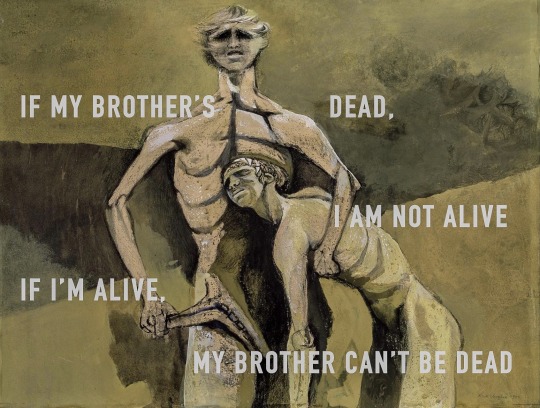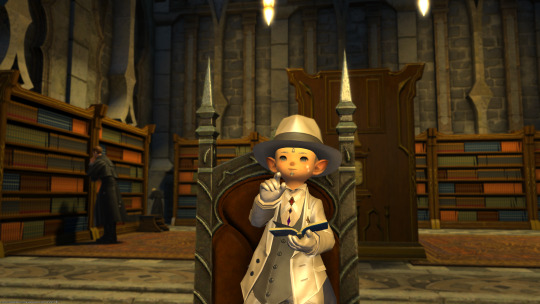Cylas | 26 | somewhat of an author I guess? | TW for NSFW stuff and exophilia/teratophilia content | I don't actually know what kale tastes like
Last active 60 minutes ago
Don't wanna be here? Send us removal request.
Text
sometimes you need dialogue tags and don't want to use the same four


3K notes
·
View notes
Text
the purest form of love is necromancy.
31K notes
·
View notes
Text
one of my favorite things to do in limited perspective is write sentences about the things someone doesn't do. he doesn't open his eyes. he doesn't reach out. i LOVE sentences like that. if it's describing the narrator, it's a reflection of their desires, something they're holding themselves back from. there's a tension between urge and action. it makes you ask why they wanted or felt compelled to do that, and also why they ultimately didn't. and if it's describing someone else, it tells you about the narrator's expectations. how they perceive that other person or their relationship. what they thought the other person was going to do, or thought the other person should have done, but failed to. negative action sentences are everything.
40K notes
·
View notes
Text

Cain and Abel, Keith Vaughan / Andrew Kozma, Song of the Insensible
3K notes
·
View notes
Note
Derin I finished book one in two days and am mad I have to wait until sometime tomorrow to start book 2
Observations so far:
1. It reminds me a bit of red dwarf if red dwarf was a lot darker and actually had something to say (note: I love red dwarf, it's how my husband and I met but I don't think the OG series had much to say besides jokes)
2. Because I follow you I have recognised your opinions about tech which I feel is neat
3. Similarly the fact that you are Australian is evident I which I also think is neat. Not sure if I would pick up on either if I didn't already know
4. I can't tell if your followers aren't normally into sci-fi and that's why they keep yelling "what the fuck" or if my reading of gay Chinese romance/horror and a really weird and metaphysical and extremely meta Korean webnovel broke my "what the fuck" meter.
5. I have had Aspen Grieves and THEIR crew for two days and if anything bad happens to them in a final way I will cry very ugly tears
6. I love love love how you write! It's so very immersive that it's easy to forget that these aren't real people from the future. This is fiction! And I love them a lot
Anyway thank you
I've seen very little Red Dwarf but "red Dwarf with something to say" is such a funny description I love it.
Yeah I'm not sure why people get so weirded out by my stories either, they're pretty middle-of-the-road scifi. I'm glad you enjoyed the book!
476 notes
·
View notes
Text
“It’s like the grief has been covered over with some kind of blanket. It’s still there, but the sharpest edges are… muffled, sort of. Then, ever now and then, I lift the corner of the blanket just to check, and… whoa! Like a knife! I’m not sure that will ever change.”
— Anne Tyler, The Beginner’s Goodbye
627 notes
·
View notes
Text
Not to go "if you have ADHD just go for a run" or anything, but I am so serious if you have ADHD you should regularly go outside, no headphones no phone no nothing and just stand and observe for a while until you've had enough. Not until you get bored, until you've had enough. Drink your coffee without watching tiktok. Have a bath without music. Turn down the volume in your headphones. I cannot overstate how much learning to be bored is cruicial with ADHD. Life is not just about pleasure, no matter what your dysregulated dopamine system thinks, and when you teach your brain to be okay with being bored, then boring tasks stop feeling like torture. By letting yourself be bored you are yoinking your system out of the high/low binary and allow for the highs to feel like actual highs and not just anything that isn't low. I am so serious go literally touch grass. Listen to the sounds in your flat. Stimulate your body the way it was designed. It lowers anxiety and makes you feel like you're real and best of all it's completely free
49K notes
·
View notes
Text
✨ What could possibly go wrong?
Pick up your pens and open your laptops! A new year is here and that means get writing!
✨ New to FFF? Let us fill you in!
Flash Fiction Friday is a fun writer event that’s meant to inspire, share and connect writings of all genres and writers of all ages. It’s designed to make people want to write, especially if they’re feeling blocked. Everyone and everything is welcome!
We always do our very best to keep the prompt’s genre open, entertaining, positive and encouraging.
Write between 100-1000 words. It can be any genre, in any text format and 18+ is fine by us, just please tag accordingly.
Use this Friday’s theme in your text. Any way you see fit.
Post on your tumblr blog and remember to tag us at @flashfictionfridayofficial!! So we’ll see it, read it and reblog it!!
Deadline is 24 hours after the prompt has been issued (12 pm CET).
And then, next Friday, we’ll mention your work in a showcase post on our main blog before our next prompt drops.
Please post your entries as regular posts, not screenshots — or provide the text as a regular post as well. Let’s keep everything as accessible as possible!
We ask you to tag your works with any appropriate content warnings and let the reader know what they’ll find before they get the chance to read your work!
If you have a question, check out our FAQ page! If your question isn’t on there, don’t hesitate to ask!
You don’t need to ask for permission or need to get added to a list to join in. Just write, have fun and don’t forget to tag us!
We do not condone fiction, asks or comments that contain: direct hostility, unconstructive critique, LGBTQIA+ hate, slurs, racism and/or general no-no behaviors.
If you want to be closer to the epicenter, you can come chat on our open discord: https://discord.gg/rUWCE8a
✨ We also introduced our very own Wishing Well, a place for you to whisper your prompt suggestions into. And we’ll listen! Check everything about it out HERE.
✨All your amazing works from last week can be found HERE.
Go check them out and consider supporting your fellow FFF writers with some likes and reblogs!
✨ And now, the new prompt!

[#FFF286 Anything Could Happen]
Diving deep into the unknown! Experimenting and testing with unexpected consequences. Off on a quest or an adventure. A fresh restart or a chance to do things differently? Will things be good? Will they be bad? Will they be simply unknowable? Get writing and let us know what your characters get up to when anything could happen!
.
.
.
The Collective <3
43 notes
·
View notes
Text
OC questions
60 questions that can be made into an OC ask game, or you can just fill everything out yourself to get to know your character a little better :)
___
[1] What first impression do they typically make? Are they likeable from the get go, or take time to grow on people?
[2] How does their social personality differ from how they act when they’re alone?
[3] What emotion is the hardest for them to deal with?
[4] How physically and emotionally affectionate they are?
[5] Are they good at keeping secrets?
[6] How direct are they in conversations, do they speak in hints and riddles or bluntly say what they think?
[7] Are they a good liar, and what would they probably lie about?
[8] How open they are about their true feelings, both positive and negative?
[9] What is their love language?
[10] How quickly do they fall for someone?
[11] What are small things that make them happy?
[12] How high is their self-esteem?
[13] What kind of sense of humor do they have, if any?
[14] What does it take to make them laugh, and what does their laugh sound like?
[15] How do they act around people they don't like?
[16] Do they easily rely on others to help them out, or prefer doing everything themselves?
___
[17] What is their biggest struggle that no one around them is able to understand or believe?
[18] Do they ever have to hide their identity and for what reason?
[19] If they could change one thing about their past, what would they change?
[20] When they’re sad or upset, do they need company or some time alone?
[21] When they’re sick, would they want others to visit and take care of them, or they would rather prefer not to be seen at not their best?
[22] Do they have nightmares, and if yes, when did they start and what are they usually about?
[23] What was the worst, the darkest period of their life that they have been through?
[24] How hard it is for them to not allow their emotions to cloud their judgement?
[25] Do they have fears and phobias, and if they do, do they usually keep it to themselves or talk about it openly?
[26] Do they have any physical or mental ilness, how do they handle it and how open they are about it?
[27] Do they have any scars, how did they get them and how do they feel about them?
[28] What is something that they will never be able to forgive?
[29] How do they deal with loss, stress and anger?
[30] What are their most healthy and most unhealthy coping mechanisms?
[31] How hard it is for them to own up to their mistakes and wrongdoings?
[32] Is there something they've done in the past that they deeply regret till this day?
[33] What are one of their fondest and most treasured memories?
___
[34] Do they have vices they don't want others to know about?
[35] Do they like their own appearance, and what do they do, if anything, to alter it in any way?
[36] Do they own items that have sentimental value?
[37] How would they spend a lazy day when they have nothing specific to do?
[38] What do they usually do or where do they go when they need to feel comfortable and safe?
[39] What is their sleeping habits and favorite sleeping position, either alone and with someone?
[40] How picky they are with food, do they have specific dietary requirements based on their health or culture?
[41] What’s their usual morning routine?
[42] What is their idea of a perfect friendly hangout and/or romantic date?
[43] Do they enjoy flirting or being flirted with?
[44] On a party, where would you find them?
[45] For an event, would they dress like they typically do, or go all out?
[46] Would they rather dress to look attractive or to feel comfortable, and what would they never wear?
[47] Do they drink alcohol, and if they do, how much and how often?
[48] Are they, or were they at some point in their life, a part of any subculture?
___
[49] Do they possess any unexpected skill or knowledge that surprises others, and otherwise, what is something anyone would assume they know or can do, but in fact they don’t?
[50] What are they really good and really bad at?
[51] How good are they with money?
[52] Do they speak any other languages aside from their own?
[53] Do they like to sing and how confident they are with their singing?
[54] Do they like giving gifts, and how good are they at picking good gifts?
[55] How long does it take for them to make a new place feel like home, and what do they need for it?
[56] How would they react to hearing a dirty joke?
[57] What was the most stupid or dangerous thing they have ever done?
[58] In the situation where they had to choose, would they rather stay loyal to their morals or to people they love?
[59] What would they want to be remembered for?
[60] If they were to commit a crime, what kind of crime would it most likely be?
---
some of these question were written myself, some are the courtesy of my friend, and some were brought from my questionnaires in my old fandom. if you use them, please reblog or link back to this post
1K notes
·
View notes
Text
Collection of Various OC Ask Games I've Created (in case any are useful).
Winter Greenery OC Questions.
Autumn Symbolism OC Questions.
Herbal OC Questions.
Little OC Creation Ask List.
OC Questions on the Seven Colours of Medieval Heraldry.
OC Questions on the Seven Forms of Love.
Cemetery Symbolism OC Questions.
OC Questions On Friendship and Companionship.
Heraldic OC Questions.
FFXIV Screenshot Meme (2).
Seven Capital Virtues - OC Asks!
Another Obscure Screenshot List!

208 notes
·
View notes
Text
Symbolism of Metals OC Questions.

A little list of OC questions based on the symbolism of various metals throughout history. This is not intended to be an exhaustive list of all symbolic meanings, but rather just a small selection for entertainment, rather than educational, purposes.
Iron - Inner Power, Rage and Primal Urges.
Has your OC ever regretted something they have said or done in anger? Perhaps this has happened more than once?
Has your OC mellowed as they have got older? Or are they just as quick to anger, or as easily irritated, as they ever were?
Upon what does your OC draw to get them through situations of great adversity? Their sense of purpose? The thought of their loved ones? Sheer overwhelming rage? Or perhaps something else entirely?
Does your OC struggle to contain their baser emotions, such as lust, aggression or greed? What helps to keep these feelings in check (if anything actually does)?
Are others ever surprised by your OC's steely resolve or ability to endure hardship? Or are they generally regarded as someone with great inner reserves of willpower?
Gold - Wisdom, Wealth and Nobility.
If your OC was called upon to arbitrate between the nobility (or an equivalent social elite) and the common people, on which side of the table would they be sitting during negotiations?
Do those that know your OC consider them to be wise? Is this quality seen as distinct from intellectulism or book-learning in their case? Or do they posess both academic knowledge and the wisdom of experience?
Does your OC struggle to believe anyone is truly smart unless they are also rich?
Does your OC hold that some social groups have an inherent nobility unavailable to others? Do they perhaps believe in the idea of a "ruling class", with qualities that the lower orders could never hope to evince? Or, conversely, do they believe in the unsullied nobility of the poor, in contrast to the decadent and corrupt upper classes?
If your OC could pass on a piece of wisdom to others starting out on a similar path to their own, what would it be and where does it come from?
Lead - Sin, Death, Transformation and Toxicity.
Which experience of loss or bereavement has most affected your OC?
What is your OC's most anti-social trait? Do they acknowledge it as such? Are they even aware of it themselves?
Which sin is your OC most likely to be accused of by others? Would this be fair criticism? Or are their actions often somewhat misunderstood?
What has been the most transformative experience your OC has been through? Was it an experience of loss? The first time they ever felt loved? A traumatic or violent event? Or something else entirely?
How does your OC believe they will die? Peacefully in bed surrounded by friends and family? Or alone in the wilderness? Or fighting against overwhelming odds? Or perhaps they have a different notion altogether?
Silver - Intuition, Honesty and Wisdom.
Does your OC ever base their decisions on a "gut feeling"? Or do they always weigh up the pros and cons carefully and dispassionately?
How tactful is your OC? Are they able to frame criticism constructively and give feedback in a way that protects against potential hurt feelings? Or are they blunt, or even callous, in their attitude to the failings of others?
Does your OC believe they can assess someone's character upon first meeting them? Or are they inclined to give everyone the benefit of the doubt until they get to know them better? Or even to assume the absolute worst of people until it is conclusively proved that they are not an enemy?
Does your OC ever deliberately make themselves appear less wise or astute than they actually are? Perhaps in order to ensure that others underestimate them?
What is something that your OC would find incredibly hard to lie about? Even if they really wanted to do so...
Copper - Love, Beauty and Creativity.
Does your OC believe that they are beautiful? Is their beauty, or lack of beauty, something to which they ever give much consideration?
Does your OC enjoy creating things? Are they particularly artistic? Or do they prefer to focus upon creating things with a practical use?
Was your OC loved as a child? What difference has the experience of love and nuture during their early years made to their character as an adult?
Of all the places your OC has seen, which do they consider the most beautiful?
If your OC were to be immortalised in art, what would be their preferred medium? An epic poem? An exquisite statue? A flattering painting? Or something else entirely?
Tin - Life, Breath and Flexibility.
How quick is your OC to adjust to changing circumstances? Are they more likely to keep going with an existing approach or strategy, even though the situation has changed?
Does your OC work well with others? Even if their approach or attitude is markedly different to their own?
Does your OC believe that all life is sacred on some level? Or are some types of person more valuable than others? Can someone's deeds ever make them deserving of death? Or would your OC never consider that an appropriate sanction, no matter the circumstances?
What does your OC believe makes life worth living? Assuming that they do, in fact, believe that it is?
Has your OC's life turned out how they were expecting when they first began their journey? How well have they adjusted to any differences in this regard?

372 notes
·
View notes
Text
Springtime Symbolism OC Questions.

A little list of OC questions based on Spring Symbolism in North West European Heraldry. Obviously many of these things have different symbolic meanings in different cultures and have had different associations at different points in history - this list is intended more for diversion than serious historical analysis.
Green Leaves and Blossoms - The Promise of Renewal.
Does your OC hold onto hope for a better future? For themselves? For those they love? Or for their society?
Has your OC ever made a conscious decision to make a fresh start? Or have they even reinvented themselves completely? What did they hope to leave behind? Was it truly possible to do so?
Is your OC skilled in repairing or rebuilding what is broken or worn? Or would they sooner dispose of something and replace it with something new and (perhaps) better?
Does your OC find their moods affected by the seasons? Do they struggle more during colder and darker months? Or do they find unique pleasure in each season?
What would social or cultural renewal mean to your OC? A return to a previous golden age of freedom, tradition or peace? Or a fresh beginning for society into something new and enhanced?
Eggs and Lambs - Birth and Fertility.
Does your OC know much about the circumstances of their birth? (or creation, as the case may be) Who was present? Was it planned or expected? Was their arrival celebrated? Or resented?
Does your OC have an affinity for plants and gardens? Have they ever played an active role in harvesting crops or foraging for roots or mushrooms? Or is the actual production of the food they eat quite alien to their everyday life?
If your OC has ever given birth, was this a positive or a traumatic experience for them? If they have not or could not do so, then how much use would they be during a birth? Would they be confident in assisting? Or would they prefer to be far away from the process?
Was your OC considered to be a cute baby? Are there any pictures or keepsakes from this time in their life? If they were never a baby then what sense do they make of the helplessness and dependence of tiny babies?
Does your OC plan to have children? Or plan to have more children if they already have a child? If not, then is this because they dislike children? Or because they consider themselves unsuited to the task of parenting? Or for another reason?
Flowers and Sunshine - New Love and Romance
Would your OC be delighted to receive flowers from a partner or admirer? Or would they be slightly nonplussed - or even offended?
What would your OC consider a romantic gift or gesture if they were planning such a thing for someone? If they aren't romantically inclined themselves, then what advice would they give another person?
What would your OC wear to meet a new or prospective lover in the Springtime? If they are not interested in romance themselves, then what would they advise a friend or sibling to wear to match the season?
Does your OC's wardrobe change as the weather gets lighter and warmer? Does this impact how others see them? And is garnering certain reactions entirely intentional? If not from the wider public, then perhaps from a lover or partner?
Does your OC ever get crushes on other people? Or did they do so in their younger days? Do they remember these fondly? Or does recalling such things make them cringe?
Cleaning and Washing - Starting Anew
What old habits or negative behavioural patterns has your OC left behind? Was this something they found easy? Or did it take time and/or help from others?
Does your OC have any Springtime rituals? Either personal (spring cleaning or shopping for a new outfit for example) or traditional to their culture or society (a ritual dance or cleansing).
Does your OC need their partner or friends to hold them accountable when they are trying to make a positive change? Or do they prefer to quietly resolve to make a change and not involve anyone else in the process?
Has your OC ever burned or otherwise destroyed something that reminded them of unhappy times or experiences in their past? Was this part of an arranged event? Or something they did spontaneously or in anger?
What is a habit or behaviour that your OC wishes to modify or adopt in the future? What has held them back from making this change in the past?

126 notes
·
View notes
Text
OC Questions on the Seven Forms of Love.

A little list of OC questions based on the seven types of love identified in Ancient Greek thought. Obviously this is a highly simplified presentation of some quite complex philosophical concepts from Classical History, intended more for the purposes of entertainment than education. I also left out Mania, which is arguably an eighth type of love (Obsessive), because I'm keeping it mostly positive in these tricky times!
Eros – Romantic, Passionate Love.
Is your OC romantic in the traditional sense? Do they enjoy giving or receiving gifts of flowers or confectionary? Or are there other courtship traditions from their culture of origin that are important to them?
How important is sex to them in a relationship? Do they see it as something essential to their happiness? Would they be able to remain in a monogamous relationship with someone they loved without sex?
How do they feel about public displays of romantic affection? Does it make them uncomfortable? How do they feel if a romantic partner kisses them in public?
Do they believe in love at first sight? Have they ever developed a crush or romantic (or erotic) fixation upon a stranger based on their appearance alone?
How closely is their opinion of their own beauty (or lack thereof) linked to their confidence? Do they see themselves as more or less worthy of love or sex based on how attractive they feel?
Philia – Affectionate, Platonic Love.
Does your OC have a Best Friend? If they do then how long have they known each other and how did they meet? If they don't then do they have a close group of friends they love equally? Or are they more of a loner?
Does your OC find it easy to make friends? Or are there barriers to them doing so? If so then are these due to issues of inclination, communication, or something else entirely?
What qualities does your OC most value in a friend? Loyalty? Shared sense of humour? Or something else?
Is your OC able to build close friendships with people very different from themselves? Perhaps in terms of culture, age or personality?
What is their most fervent wish for their best friend(s)? How far would they go to make it happen?
Storge – Unconditional, Familial Love.
Did your OC's parents love them unconditionally? If so then has this helped them feel confident as an adult? If not then how has this affected them? What were the conditions their family attached to their relationship?
Does your OC have children? If so then how fiercely do they love them? If they have more than one then do they love them all equally? If they do not have children then is this part of their future plans?
How far does parental approval (imagined or expressed) impact upon their current sense of self-worth? What might they sacrifice or attempt to achieve in order to ensure the approval of their parents?
Does your OC have any siblings? If so then did their parents have a favourite growing up? Has their relationship with their sibling changed in adulthood? If they don't have any siblings then do they perhaps feel they have missed out on an important relationship? Do they have any especially close friends who go some way towards filling that role?
Is your OC able to love without necessarily needing or expecting reciprocation or reward? Or are all their relationships to some extent transactional? Have they ever loved another person unconditionally, whether a child or another adult?
Agape – Selfless, Universal Love.
Does your OC wish to make the world a better place? How far do they see that as being their responsibility? What lengths would they go to in order to help achieve this?
Does your OC feel a spiritual connection to the world around them? Do they have a particular love for nature or living things?
To what extent does your OC believe in the value (or even existence) of true altruism? Do they see an unselfish concern for the welfare of others as being naïve or foolish? Or as a moral quality to which people should aspire?
Does your OC have a religious faith which emphasises the importance of a love for all people? If so then do they try to follow these teachings authentically? Or do they just pay lip-service to them? If not then do they follow a more martial or mercantile faith? Or none at all?
Does your OC find it easy to empathise with their enemies? Or do they see it as important to dehumanise them in order to combat them with sufficient determination?
Ludus – Playful, Flirtatious Love.
Does your OC have any particular favourite chat up lines? If not for themselves then perhaps ones they have suggested to a friend? How effective do these tend to be?
Is your OC particularly skilled at flirting? Have they had to practice this or does it just happen naturally?
How does your OC feel about one night stands? Have they ever enjoyed a night of passionate romance with a stranger? Is this something they are quite keen on recreationally? Or only something they might engage in under specific circumstances (such as the eve of a battle or after a difficult breakup)?
Who was your OC's first crush? How do they feel about it now?
What seduction techniques are most likely to be effective when it comes to your OC? Are there some things guaranteed to get them going? Or are they immune to such things?
Pragma – Committed, Long-Lasting Love.
Is your OC in a committed long-term relationship (or relationships)? If so then what has contributed to this relationship lasting so well? If they are not in such a relationship, then is this something that saddens them or which they regret?
What is the biggest challenge that your OC has had to overcome in a long-term relationship or friendship? What helped them get through this?
Are your OC's parents still together? To what degree do they look to their own parents as a model for their own ideal relationship?
After the initial fires of passion cool to some degree, what would keep your OC engaged in a relationship? Shared goals? Similar values? Or contented companionship?
What importance or value does your OC attach to marriage? Do they believe that it is important to make a public statement of commitment to another person (or persons)? Or are they more concerned about inheritance rights and security for their family? Or do they not see marriage as a necessary signifier of commitment and loyalty?
Philautia – Self Love.
Does your OC have a healthy sense of their own worth and value? Or do they see themselves as failing to live up to their original potential? Perhaps they are convinced of their own sinful or inadequate nature?
Does your OC believe that it is important to love themselves in the first instance? Perhaps in order to be able to give and receive love authentically? Or because they believe first and foremost in "looking after number one"?
Does your OC judge themselves by the same standards as they apply to others? Or are they sometimes hypocritical in condemning others for faults they also possess? Or perhaps they find it easier to forgive others for things that they cannot abide in themselves?
Which of your OC's qualities makes them the most proud? Do they think more people should be like them in this regard? Or do they quite like being rare in possessing it?
Has your OC always had the same opinion of themselves or has this changed over time? Have they learned to love themselves - perhaps with the help of others - as their journey progressed? Or have the consequences of their actions only served to erode their sense of self-worth?

4K notes
·
View notes
Text
Cemetery Symbolism OC Questions

A little list of OC questions based on Victorian Graveyard Symbolism (obviously some of the symbols mentioned here had more than one meaning, or a meaning which changed over time, it's not intended to be exhaustive, merely illustrative of some themes). I hope you enjoy the list!
Skull - Mortality.
Does your OC often reflect upon their own mortality? Is it something which they fear?
Does your OC have a "bucket list" of things they would like to do (or places they would like to see) before they die?
Who is the most significant person your OC has lost? Have they fully processed their grief? Or can certain things trigger a flood of emotions?
Is there a person who your OC cannot bear the thought of losing? What lengths would they go to in order to keep them safe?
Does your OC observe any ceremonies or festivals of remembrance? Who do they memorialise? How does your OC feel on these occasions?
Harp - Hope.
Is your OC an optimist? Do they tend to believe things will work out for the best? Or do they prefer to anticipate the worst, in order to be pleasantly surprised if it does not occur?
If your OC could make one wish to change the world for the better then what would they choose?
Has your OC fulfilled the hopes of their parents or their community? How do they feel about these in retrospect?
To what does your OC cling to in extremes of despair or danger? A faith? A mission? Or something else?
Does your OC galvanise hope in others? How do they encourage or rally others when they fall to despair?
Heart - Devotion.
Does your OC inspire devotion in those around them? What form does this take? Adulation? Romantic attachment? Ferocious loyalty? Or something else?
Is your OC particularly pious? Do they follow a religious faith? Or did they once have a faith which they lost? If they are not religious then how do they feel about those who are?
Does your OC have an irreverent sense of humour, even (or especially) about the things which are important to them? Or do they treat such things with great solemnity?
Is your OC particularly patriotic? What does their country or other place of origin mean to them?
Does your OC remain loyal to those they love, regardless of the rights and wrongs of any given situation? Would they support them even if they were in the wrong? Even if they committed a serious crime?
Cherub - Innocence.
Is your OC particularly knowledgeable about matters of the flesh? Are they easily shocked or scandalised? Or are there relatively few fetishes, positions, or unusual uses of implements of which they have not heard - or possibly even attempted?
Does your OC swear in day to day conversation? Or only when they are startled or angry?
Did your OC have a sheltered upbringing? Did anyone educate them about sex and relationships? Or were such things not discussed? If their family did not give them this information then how did they find out?
Does your OC adjust their language or behaviour around children? Are there some topics they avoid discussing in front of them - like war or death - because they would prefer to shield them from such things until they are older?
What is something your OC has learned that they would rather never have known?
Tree - Knowledge.
Does your OC have much in the way of academic learning? If so then how useful has this been to them in their adult life? If not then are they ever jealous of those with more formal education?
Does your OC have a particular area of interest or expertise? Do they enjoy sharing this interest with others? Or is it something they prefer to keep private?
Does your OC learn from experience? Or do they seem doomed to repeat the same mistakes time and time again?
Do others see your OC as particularly intelligent? Or are they considered average, or even somewhat lacking, in intellect? How accurate is this assessment?
How well does their partner, sibling or other closest person in their life know them? Are there secrets they keep even from them?
Urn - Penitence.
What is the thing about which your OC feels most guilty?
Does your OC believe that a person can be redeemed even if they have committed heinous deeds? Or do they maintain that some crimes can never be forgiven?
Does your OC find it easy to admit when they have wronged another person? Do they find it easy to apologise?
Has your OC ever been punished for a crime or been compelled to do penance for a perceived sin? Did they feel this was just at the time? Has their view changed in retrospect?
When your OC has hurt or offended someone they care about, how do they tend to make it up to that person?

387 notes
·
View notes
Text
6K notes
·
View notes
Text
the trees you grew up with have not forgotten you. their branches still whisper your name in the breeze and their roots remember the paths your feet once traced through their shade.
3K notes
·
View notes
Text
I wish all my writers a happy new year. May all your stories finally be written, sentences be completed, emotions be evoked with beautifully crafted words, readers be moved to tears, the urge to create be satisfied.
5K notes
·
View notes